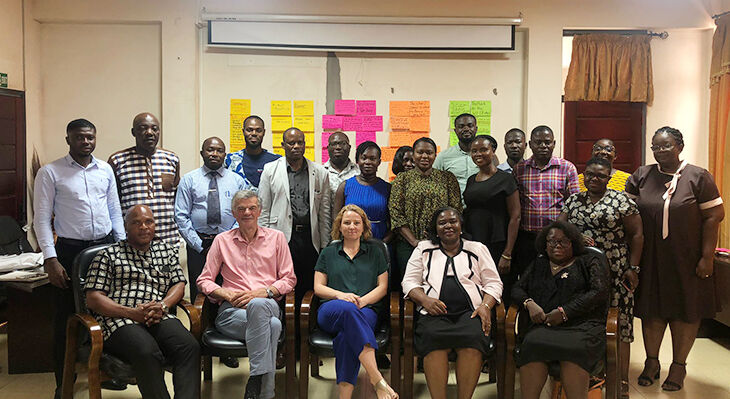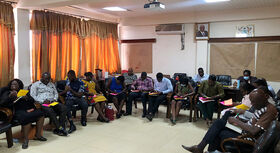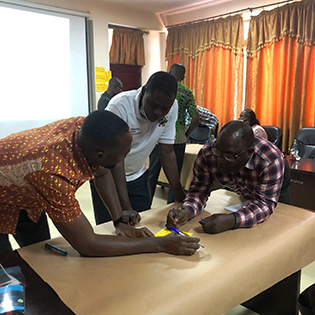Ghana – setting the future course of the Commission for TVET
How can (and must) a national vocational education and training agency be structured in order to foster a sustainable TVET system? GOVET has been working on behalf of the BMBF to advise the Ghanaian Commission for TVET on organisational development and to lay down important markers for the future.

Ghana’s vocational education and training system has been undergoing a major shift which began even before the adoption of the Education Regulatory Bodies Act (ERBA) at the end of 2020. As soon as the Joint Declaration of Intent was concluded between the Ghanaian Ministry of Education (MoE) and the German Federal Ministry of Education and Research (BMBF) in mid-2019, the topic of “organisational development consultancy for the Commission for TVET (CVET)” was stipulated as one of the main focuses of the collaboration. Acting on behalf of the BMBF, GOVET commissioned experts to implement the organisational consultancy remit.
Como Consult GmbH supported the whole of the guidance process over a period of two years from mid-2020 onwards. Because of the pandemic, numerous virtual workshops were initially held with two departments from the CVET. Planning, Project, Research Monitoring and Evaluation (PPRME) takes charge of projects and monitoring, whilst Standard, Curriculum Development & Evaluation (SCD&E) is responsible for the development of standards and curricula and for the evaluation and auditing of institutes. Both departments faced the dual difficulty of changing tasks and the integration of a large number of new colleagues. One outcome of the ERBA was that the newly founded Commission for TVET (CTVET) was allocated the role of governance of the TVET sector. As a result of this, the Council for Technical and Vocational Training (COTVET) and the National Board for Professional and Technical Examination (NABPTEX) were amalgamated into a single organisation at the beginning of 2021.
Continuity via established processes of reflection

The aims of the consultancy were to support the CTVET in undertaking a critical scrutiny of its own organisation in order to identify areas of potential for improvement and to provide both departments with the ability to initiate, adapt and conclude work processes in conjunction with external partners. The advisors from Como Consult established a process of reflection and learning in both departments with the objective of achieving continuous improvements at all levels.
The virtual format of the consultancy offered the chance to provide guidance on an ongoing basis over a longer period of time. At the same time, however, the pandemic presented a barrier to direct contact with the teams and with individual persons. This meant that there was an absence of essential opportunities for intervention, such as observation of individual and group behaviour, an understanding of the work environment, personal communication, active involvement in informal settings, role plays, and interactive group meetings.
Added value – workshops hosted locally
The consultancy workshops held in Ghana this summer enabled ground to be made up in respect of some of these components. The advisory team from Como Consult arranged full-day workshops for about 20 staff from the two departments. Further colleagues from cross-cutting departments in the areas of human resources, finance and IT participated too in order to achieve a broad effect across departments and interfaces.
The workshops have helped to increase the cohesion and relationship on departmental and individual levels. If we achieve to maintain this spirit, it will also manifest in the future and lead to good governance in the TVET sector.
Comment from one of the workshop participants
The workshops related to key organisational development topics such as quality management, teamwork, change management, human resources and conflict resolution. The methodological approaches adopted were diverse, and the practical sessions allowed the participants to apply what they had learned directly within their own working environment and to embark upon a process of reflection. Samuel Thompson, Head of the PPRME Department, was confident that the workshops had helped to produce a more professional work setting in the departments.

Sustainable benefits from the organizational consulting workshopFeedback from workshops at the Ghana Technical and Vocational Education and Training Commission.
I learned a lot about process management, teamwork and communication. The workshops have helped me to work better in teams, divide work more efficiently and keep track of our progress.